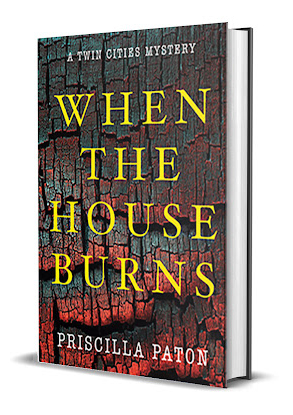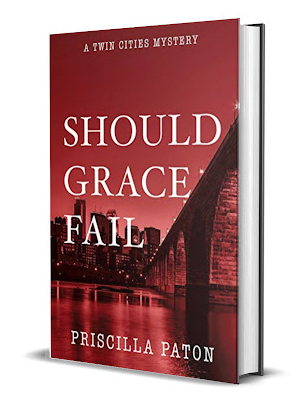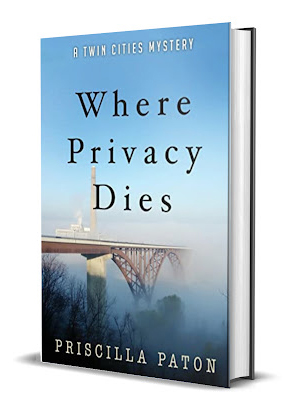 NORTHFIELD, MN – A two-time Foreword Indie Book Award finalist returns with a thrilling addition to the Twin Cities mystery series, “When the House Burns” (Coffeetown Press, February 14th, 2023). Priscilla Paton submerges the reader in a fast-paced mystery that tackles the societal implications of the COVID-19 pandemic on the housing market.
NORTHFIELD, MN – A two-time Foreword Indie Book Award finalist returns with a thrilling addition to the Twin Cities mystery series, “When the House Burns” (Coffeetown Press, February 14th, 2023). Priscilla Paton submerges the reader in a fast-paced mystery that tackles the societal implications of the COVID-19 pandemic on the housing market.
When death comes home, is nowhere safe?
The quest for love and home becomes deadly when Detectives Erik Jansson and Deb Metzger search for the killer of an adulterous real estate agent.
A volatile real estate market, unrest in a homeless encampment, jealousies among would-be lovers, a case of arson—these circumstances thwart G-Met detectives Erik Jansson and Deb Metzger as they investigate the murder of an adulterous woman. The victim’s estranged husband has holes in his alibi. A property developer grieves too much over the victim’s death, while his wife shuts him out. The developer’s assistant resents his boss, and suspects that the developer was not only involved with the victim, but is being scammed by the arsonist. A sexy young widow, friend of the victim, has past traumas triggered by the case and turns to the developer for protection. A homeless man stalked the dead woman, and now stalks the young widow. And all of them hold secrets about the past burning of an apartment complex and the man who died there.
Before the clues come together, Erik Jansson is trapped in an abandoned house as Deb Metzger hunts for a sharpshooter at a remote construction site. The case will burn down around them unless they can scheme their way out of lethal surroundings.
“When the House Burns”
Priscilla Paton | February 14th, 2023 Coffeetown | Mystery
Paperback | 978-1-68492-081-5 | $16.95
eBook | 978-1-68492-082-2 | $6.99
 Priscilla Paton grew up on a dairy farm in Maine, a state of woods, lakes, and rivers. She now lives in Minnesota, another state of woods, lakes, and rivers, not far from urban Minneapolis and St. Paul. She received a B.A. from Bowdoin College, a Ph.D. in English Literature from Boston College, and was a college professor. She has previously published a children’s book, Howard and the Sitter Surprise, and a book on Robert Frost and Andrew Wyeth, Abandoned New England. She is active in programs that support literacy, affordable housing, and the prevention of domestic violence and abuse. For fun, she enjoys her husband’s cooking and photographing birds. The first in the Twin Cities Mystery series, Where Privacy Dies, was a finalist for a 2018 Foreword Indies Book Award, and the second, Should Grace Fail, was a finalist for a 2020 Foreword Indies Book Award. You can find more about Priscilla on her website.
Priscilla Paton grew up on a dairy farm in Maine, a state of woods, lakes, and rivers. She now lives in Minnesota, another state of woods, lakes, and rivers, not far from urban Minneapolis and St. Paul. She received a B.A. from Bowdoin College, a Ph.D. in English Literature from Boston College, and was a college professor. She has previously published a children’s book, Howard and the Sitter Surprise, and a book on Robert Frost and Andrew Wyeth, Abandoned New England. She is active in programs that support literacy, affordable housing, and the prevention of domestic violence and abuse. For fun, she enjoys her husband’s cooking and photographing birds. The first in the Twin Cities Mystery series, Where Privacy Dies, was a finalist for a 2018 Foreword Indies Book Award, and the second, Should Grace Fail, was a finalist for a 2020 Foreword Indies Book Award. You can find more about Priscilla on her website.
Follow Priscilla Paton on social media:
Twitter: @priscilla_paton | Instagram: @priscillapaton
Facebook: @priscillapatonmystery | Goodreads: Priscilla_Paton
Advance Praise for When The House Burns
 “Detectives Metzger and Jansson sizzle in this smart page turner. Paton’s gift for sharp prose cuts to the bone of her well-drawn characters who drive a plot that propels the reader toward the end of this satisfying mystery.” –Matt Goldman, NYT Best Selling Author
“Detectives Metzger and Jansson sizzle in this smart page turner. Paton’s gift for sharp prose cuts to the bone of her well-drawn characters who drive a plot that propels the reader toward the end of this satisfying mystery.” –Matt Goldman, NYT Best Selling Author
“Clever and intriguing, Priscilla Paton’s latest Twin Cities Mystery, When the House Burns, does not disappoint. Full of rich details evoking the Twin Cities culture and ambience, this well-crafted mystery offers nuanced characters and an unexpected plot. Once again featuring Detectives Metzger and Jansson, the unlikely duo bring heart and personality to their investigation and pursuit of the truth.” –Susanna Calkins, award-winning author of the Lucy Campion historical mysteries and the Speakeasy Mysteries
Praise for the Twin Cities Mysteries
 “Should Grace Fail is a lively police procedural featuring an unusual and highly enjoyable pair of investigators. Snappy dialogue, sharp plotting, and a colorful cast of characters kept me entertained and guessing until the last page!” -Mindy Mejia, critically acclaimed author of Strike Me Down
“Should Grace Fail is a lively police procedural featuring an unusual and highly enjoyable pair of investigators. Snappy dialogue, sharp plotting, and a colorful cast of characters kept me entertained and guessing until the last page!” -Mindy Mejia, critically acclaimed author of Strike Me Down
“Priscilla Paton delivers another exciting Twin Cities Mystery as she reunites detectives Deb Metzger and Eric Jansson. The partners find themselves facing a complex investigation in a novel that touches on murder, racism, and police brutality. Should Grace Fail is a timely addition to the crime fiction genre.” -Elena Taylor, award-winning author of All We Buried
 “Priscilla Paton adds a fresh voice to the mystery scene with Where Privacy Dies. Paton delivers lively descriptions, and has an ear for dialogue that works well defining her characters. I loved the interactions, and verbal volleyball, between the unlikely G-Met partners, Detectives Erik Jansson and Deb Metzger. From the discovery of a well-dressed man’s body in a wetland, to the unsavory dealings of people in high places, she kept me reading, trying to figure out who was really in the bad guys’ corner.” -Christine Husom, National Best-selling Author of the Snow Globe Shop Mysteries. and the Winnebago County Mysteries.
“Priscilla Paton adds a fresh voice to the mystery scene with Where Privacy Dies. Paton delivers lively descriptions, and has an ear for dialogue that works well defining her characters. I loved the interactions, and verbal volleyball, between the unlikely G-Met partners, Detectives Erik Jansson and Deb Metzger. From the discovery of a well-dressed man’s body in a wetland, to the unsavory dealings of people in high places, she kept me reading, trying to figure out who was really in the bad guys’ corner.” -Christine Husom, National Best-selling Author of the Snow Globe Shop Mysteries. and the Winnebago County Mysteries.
“Fans of SJ Rozan and Deborah Crombie are going to love the mismatched crime fighters at the center of this masterful and timely debut novel; Priscilla Paton tells their story with confidence, style and cunning.” -David Housewright, Edgar Award-winning author of Like to Die
In an interview, Priscilla Paton can discuss:
- How personal housing experiences amid the pandemic informed her writing
- Why she weaves commentary on social issues into her mysteries
- Her process when researching new settings for a book
- How her writing process changed and evolved during the pandemic
- How writing from multiple perspectives helps shape the plot of a mystery
An Interview with Priscilla Paton
This is your third installment in the Twin Cities Mysteries, what are some of the challenges in writing a series? What are some of the joys?
The joys include letting loose Erik Jansson and Deb Metzger with their prickly rapport, mischief, and unusual take on their jobs. I also have to keep them and plot devices from becoming repetitious. I develop the new characters first, all their kinks and problems, to give the detectives fresh challenges and a distinct context. I also like that I need to continue “researching” the Twin Cities area—parks, restaurants, neighborhoods, lakes. That’s scenic and fun.
How did the COVID-19 pandemic impact your research and writing process?
This is a big one. While accustomed to working at home, I was not used to sharing Zoom bandwidth with my “spousal unit.” I did feel cut off from my sources—I wasn’t doing site visits, hanging out in coffee shops to eavesdrop, or doing in-person interviews. Like many people, I experienced anxiety. Writing was sometimes agonizing, and I wouldn’t have made it without Google as a distraction and research assistant. I saw amazing houses online to fictionalize and use as backdrops—one featured a Wonder Woman mural. I also had to move during the shutdown!
Why was it important to weave in commentary about the housing crisis in this novel?
I didn’t intend to write about the housing crisis—I had another topic in mind. Then a real estate agent was murdered in the Twin Cities (a case unlike the fictional one in the book), I had to move during the crisis, and relatives were also searching for housing. Also, I’m on nonprofit boards and a chronic issue is finding safe housing for people in crisis. In general, I don’t set out to “prove” a point; rather, I’m exposed to the issues so including them is natural.
Your novels return to the same characters throughout the series. As a writer how do you push yourself to explore these characters in new and dynamic ways for your audience?
It’s a challenge, especially after the pandemic shutdowns when everyone seemed to stand in place and not advance. Erik Jansson and Deb Metzger will keep their idiosyncrasies, but they also must adapt to an ever-changing social scene and higher expectations. As they “mature,” they take on more responsibilities, but they too must avoid feeling in a rut. The news, unfortunately, provides new crimes and dangers for a fiction writer and her characters to contemplate. These characters have frisky imaginations, and I work to keep up with them!
Your villains aren’t necessarily all bad. Can you comment on this?
Some characters are simply bad because such people exist and commit horrific crimes without regret. More often, I’m interested in the tangle of circumstances that drives someone to do their worst and the impact such acts have on them, from empowering them to destroying them. Also, it makes the detectives’ job harder to have suspects apparently within normal range, even likable.
Your writing goes to some dark places, but there’s also humor. How do you balance the somber and the comic?
For me, writing about crime and topics like domestic violence is a way to engage the real world and to escape it. The news can drown you, and you may, to paraphrase poet Emily Dickinson, face the truth slant. In writing, I can satirize foibles and awkward encounters, the office rivalries and the committee work Erik and Deb endure. My characters also have to face painful realities: racism, police brutality, the impact of murder on individuals and families. The stress sometimes comes out in their repartee.
What are you working on next?
I’ve started a standalone novel, but my detectives Jansson and Metzger keep butting in. I deserve that because I’ve left their sex lives and love lives unresolved. So I’m not sure what form the next book(s) will take, but I’m fascinated by family estrangement, betrayal, and recovery or restoration after betrayals. One potential character is back-to-nature and works in prairie restoration while another lives in a modern mansion and works on tech projects; that means I can check out very different settings. I’m also researching dyslexia and how that shapes a young person’s life.

A former award-winning journalist with national exposure, Marissa now oversees the day-to-day operation of the Books Forward author branding and book marketing firm, along with our indie publishing support sister company Books Fluent.
Born and bred in Louisiana, currently living in New Orleans, she has lived and developed a strong base for our company and authors in Chicago and Nashville. Her journalism work has appeared in USA Today, National Geographic and other major publications. She is now interviewed by media on best practices for book marketing.
